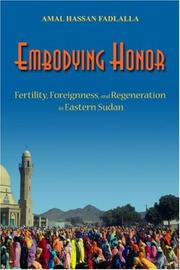| Listing 1 - 6 of 6 |
Sort by
|
Book
Year: 1954 Publisher: Cambridge, [Eng.] : University Press,
Abstract | Keywords | Export | Availability | Bookmark
 Loading...
Loading...Choose an application
- Reference Manager
- EndNote
- RefWorks (Direct export to RefWorks)
Book
Year: 1954 Publisher: Cambridge : University press,
Abstract | Keywords | Export | Availability | Bookmark
 Loading...
Loading...Choose an application
- Reference Manager
- EndNote
- RefWorks (Direct export to RefWorks)
Book
ISBN: 9171469052 9789171469052 Year: 1991 Publisher: Uppsala: Nordiska Afrikainstitutet,
Abstract | Keywords | Export | Availability | Bookmark
 Loading...
Loading...Choose an application
- Reference Manager
- EndNote
- RefWorks (Direct export to RefWorks)
Beja (African people) --- Ethnology --- Dahl, Gudrun, - 1948 --- -Sudan
Book
ISBN: 9771805487 Year: 2008 Publisher: [al-Qāhirah] : Maṭbaʻat Dār al-Kutub wa-al-Wathāʼiq al-Qawmīyah bi-al-Qāhirah,
Abstract | Keywords | Export | Availability | Bookmark
 Loading...
Loading...Choose an application
- Reference Manager
- EndNote
- RefWorks (Direct export to RefWorks)
Nomads --- Maʻaza (Arab tribe) --- Beja (African people) --- Eastern Desert (Egypt) --- Social life and customs.
Book
ISBN: 9780226126968 9780226127019 022612696X 022612701X Year: 2016 Publisher: Chicago, Ill. University of Chicago Press
Abstract | Keywords | Export | Availability | Bookmark
 Loading...
Loading...Choose an application
- Reference Manager
- EndNote
- RefWorks (Direct export to RefWorks)
Hundreds of exceptional cartographic images are scattered throughout medieval and early modern Arabic, Persian, and Turkish manuscript collections. The plethora of copies created around the Islamic world over the course of eight centuries testifies to the enduring importance of these medieval visions for the Muslim cartographic imagination. With Medieval Islamic Maps, historian Karen C. Pinto brings us the first in-depth exploration of medieval Islamic cartography from the mid-tenth to the nineteenth century. Pinto focuses on the distinct tradition of maps known collectively as the Book of Roads and Kingdoms (Kitab al-Masalik wa al-Mamalik, or KMMS), examining them from three distinct angles-iconography, context, and patronage. She untangles the history of the KMMS maps, traces their inception and evolution, and analyzes them to reveal the identities of their creators, painters, and patrons, as well as the vivid realities of the social and physical world they depicted. In doing so, Pinto develops innovative techniques for approaching the visual record of Islamic history, explores how medieval Muslims perceived themselves and their world, and brings Middle Eastern maps into the forefront of the study of the history of cartography.
Cartography --- Geography, Arab --- History --- Islam --- Geodesy. Cartography --- anno 500-1499 --- Beja (African people). --- Cartography. --- Geography, Arab. --- Geography, Medieval. --- Iṣṭakhrī, Ibrāhīm ibn Muḥammad, --- Islamic Empire. --- Cartography - Islamic countries - History --- Arab geography --- Geography, Arabic --- Geography, Medieval --- Cartography, Primitive --- Chartography --- Map-making --- Mapmaking --- Mapping (Cartography) --- Mathematical geography --- Surveying --- Map projection --- Maps --- History.

ISBN: 0299223833 9780299223830 0299223809 9780299223809 0299223841 9780299223847 Year: 2007 Publisher: Madison, Wis. University of Wisconsin Press
Abstract | Keywords | Export | Availability | Bookmark
 Loading...
Loading...Choose an application
- Reference Manager
- EndNote
- RefWorks (Direct export to RefWorks)
In the Red Sea Hills of eastern Sudan, where poverty, famines, and conflict loom large, women struggle to gain the status of responsible motherhood through bearing and raising healthy children, especially sons. But biological fate can be capricious in impoverished settings. Amidst struggle for survival and expectations of heroic mothering, women face realities that challenge their ability to fulfill their prescribed roles. Even as the effects of modernity and development, global inequities, and exclusionary government policies challenge traditional ways of life in eastern Sudan and throughout many parts of Africa, reproductive traumas--infertility, miscarriage, children's illnesses, and mortality--disrupt women's reproductive health and impede their efforts to achieve the status that comes with fertility and motherhood. In 'Embodying Honor' Amal Hassan Fadlalla finds that the female body is the locus of anxieties about foreign dangers and diseases, threats perceived to be disruptive to morality, feminine identities, and social well-being. As a "northern Sudanese" viewed as an outsider in this region of her native country, Fadlalla presents an intimate portrait and thorough analysis that offers an intriguing commentary on the very notion of what constitutes the "foreign." Fadlalla shows how Muslim Hadendowa women manage health and reproductive suffering in their quest to become "responsible" mothers and valued members of their communities. Her historically grounded ethnography delves into women's reproductive histories, personal narratives, and ritual logics to reveal the ways in which women challenge cultural understandings of gender, honor, and reproduction.
Hadendowa (African people) --- Women --- Sex role --- Fertility, Human --- Hadandowa (African people) --- Haddendowa (African people) --- Hadendoa (African people) --- Beja (African people) --- Ethnology --- Gender role --- Sex (Psychology) --- Sex differences (Psychology) --- Social role --- Gender expression --- Sexism --- Human fertility --- Natality --- Demography --- Human reproduction --- Infertility --- Sexual behavior. --- Social conditions. --- Social aspects --- Gender roles --- Gendered role --- Gendered roles --- Role, Gender --- Role, Gendered --- Role, Sex --- Roles, Gender --- Roles, Gendered --- Roles, Sex --- Sex roles
| Listing 1 - 6 of 6 |
Sort by
|

 Search
Search Feedback
Feedback About UniCat
About UniCat  Help
Help News
News